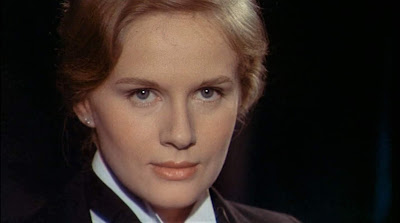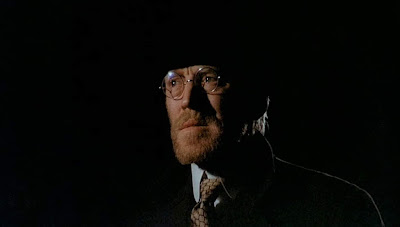"When you get older, there isn't a lot left to be frightened of."
Mrs. Ada Quonsett Airport (1970)
I was an easy scare as a kid. Afraid of the dark as well as my own shadow, I posed little challenge to older sisters who loved to leap out at me from closets and around corners; their shouts of “Boo!” eliciting a shriek of terror or tearful outburst (often both), followed by the usual threat-yelled-in-retreat, “I’m gonna tell mamma!”
Paradoxically, when not being terrorized by siblings, I did a pretty good job of terrorizing myself. I'm not sure why, but being a dyed-in-the-wool scaredy-cat proved no deterrent to raiding my sister's horror comic book collection (resulting in nightmare-filled bouts of sleeping with the bedcovers pulled all the way over my head), or watching scary anthology TV shows like Thriller or The Outer Limits. Programs that taught me no good can come of exploring the source of a mysterious noise, and that fear comes with its own soundtrack. Just hearing the first few notes of Gounod's Funeral March of the Marionette (aka, the theme from Alfred Hitchcock Presents) was enough to make my skin go all gooseflesh. Similarly, John Williams’ nerve-jangling Suspense Theater theme and that hair-raising whistling intro to Journey to the Unknown.
 |
| Toni Collette as Annie Graham |
 |
| Gabriel Byrne as Steve Graham |
Naturally, this masochistic desire to have the bejesus scared out of me extended to movies, too, but by the time big-screen psychological thrillers replaced the atomic monsters and vampires of Saturday afternoon TV, I'd developed a better understanding of what I was after: the emotional jolt of the safe, vicarious scare. The payoff was that my naturally jittery nature meant that I got more bang for my buck.
I came to enjoy the sensation of sitting in the dark and surrendering myself to whatever reality these films presented; the deeper I immersed myself, the more thrilling the ride. But with the waning of the 1960s, the make-believe horrors of movies like Wait Until Dark (“What did they want with her? What did they want with her?” screamed the film's poster ad copy to my abject terror) and Rosemary’s Baby (“What have you done to its eyes?”) couldn't keep pace with the real-life terrors served up every night on the TV news. Fiction proved no match for the horrific reality of the assassinations of Martin Luther King, Jr. and Bobby Kennedy; the unsolved mystery of the Zodiac Killer; or the nightmare of the Manson Family. So when feeling frightened became a way of life instead of an escapist outlet, I knew it was time to give horror movies a rest.
 |
| Alex Wolff as Peter Graham |
 |
| Milly Shapiro as Charlie Graham |
While I don’t tend to think of myself as a horror movie fan, I obviously consumed enough of them to start to take notice of the clichés, the repetition, and the recycling of themes. Instead of offering up the unanticipated and disturbing, horror movies began to pander to their audiences by following box-office-driven guidelines geared to giving the horror fan everything they expected.
The more market-friendly horror movies became, the more they needed to resemble product. Goodbye, to the unexpected, and hello to by-the-numbers horror plotting and slasher villains armed with quotable quips and taglines.
Which is a shame, because now that I'm no longer the easily-scared kid I used to be, finding a horror movie that gets me to believe in the unbelievable is hard enough; finding one that's actually frightening is becoming a near-impossibility. Gore, jump-edits, loud noises, and a heavy metal song played over the closing credits does not a horror film make (which should come as news to Elie Roth and Rob Zombie). For a movie to really scare me, it at least has to come from a place that is emotionally honest. Hopefully, while tapping into some elemental, suppressed anxiety rooted in human vulnerability and the fear of mortality.
The more market-friendly horror movies became, the more they needed to resemble product. Goodbye, to the unexpected, and hello to by-the-numbers horror plotting and slasher villains armed with quotable quips and taglines.
 |
| The Graham Home As haunting a presence in Hereditary as The Overlook Hotel in The Shining |
Which is a shame, because now that I'm no longer the easily-scared kid I used to be, finding a horror movie that gets me to believe in the unbelievable is hard enough; finding one that's actually frightening is becoming a near-impossibility. Gore, jump-edits, loud noises, and a heavy metal song played over the closing credits does not a horror film make (which should come as news to Elie Roth and Rob Zombie). For a movie to really scare me, it at least has to come from a place that is emotionally honest. Hopefully, while tapping into some elemental, suppressed anxiety rooted in human vulnerability and the fear of mortality.
 |
| Ann Dowd as Joan |
Two recent films effectively and memorably accomplished such a feat. The first was in 2017 when Get Out, the impressive feature film debut of director/screenwriter Jordan Peele, hit me where I lived by using the daily microaggressions of soft racism as the core of its horror premise. The second time was in 2018 when director Ari Aster, another emerging filmmaking talent, made his directing / screenwriting debut with Hereditary. While Get Out was unsettling in a thoroughly unique and personal way (the Black experience of racism as terrorism has always been ripe fodder for the horror genre), Hereditary bridged the above-stated "near-impossibility" gap by reacquainting me with the almost-forgotten, old-fashioned, pleasurable unpleasantness of simply being scared shitless by a motion picture.
I came to Hereditary not knowing anything about the story; all I knew was that it was a movie starring Toni Collette, an actress (like Laura Dern) I could watch in anything. I’d just finished binge-watching Collette's limited BBC One series Wanderlust on Netflix, and her extraordinary performance in that program left me clamoring for more. Always intrigued when an actor of her caliber appears in a horror movie, I purposely avoided reading anything about Hereditary beforehand, preferring to dive in blindly with eyes wide open, curiosity piqued, and with a great deal of enthusiasm.
I wasn’t disappointed.
In fact, I’m not even sure it's possible to be disappointed by Hereditary, for it's a film that has, as its primary defining characteristic, a dogged refusal to deliver anything remotely resembling the expected.
The death of a family matriarch is the catalyst event sparking an interlinked eruption of remorse, reflection, and revelation that ultimately sends an already loosely-tethered family spiraling horrifically out of control. Annie (Toni Collette), whose mother died in hospice after a long, grasping illness, is an artist whose method of coping with her traumatic childhood is to recreate the most painful events in breathtakingly disturbing miniature dioramas. And with a history involving a mother who suffered from dissociative identity disorder; a clinically depressed father who starved himself to death; and an older brother with committed suicide when she was just a teenager, Annie is not exactly at a loss for traumas to draw upon for her work.
Understandably, Annie's family legacy of mental illness hasn't left her unscathed. In fact, her husband Steve (Gabriel Byrne) is the psychiatrist who saw her through a nervous breakdown. No longer his patient and largely managing to handle her issues with her late mother, a dark cloud hangs over the family due to a terrifying sleepwalking incident two years prior, in which Annie doused herself and her two sleeping children in paint thinner, awakening only as she heard herself striking a match. As a result, Annie's relationship with her now 16-year-old son Peter (Alex Wolff) has grown strained and contentious. At the same time, her 13-year-old developmentally disabled daughter Charlie—who shared an unnaturally close relationship with her deceased grandmother—also channels her emotional dissociation into creating art. In her case, the creation of creepy, pagan-like figurines.
In fact, I’m not even sure it's possible to be disappointed by Hereditary, for it's a film that has, as its primary defining characteristic, a dogged refusal to deliver anything remotely resembling the expected.
 |
| Portrait in Black |
The death of a family matriarch is the catalyst event sparking an interlinked eruption of remorse, reflection, and revelation that ultimately sends an already loosely-tethered family spiraling horrifically out of control. Annie (Toni Collette), whose mother died in hospice after a long, grasping illness, is an artist whose method of coping with her traumatic childhood is to recreate the most painful events in breathtakingly disturbing miniature dioramas. And with a history involving a mother who suffered from dissociative identity disorder; a clinically depressed father who starved himself to death; and an older brother with committed suicide when she was just a teenager, Annie is not exactly at a loss for traumas to draw upon for her work.
 |
| Small Worlds |
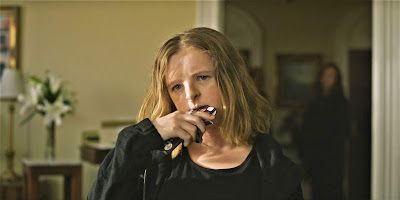 |
| Charlie and the Chocolate Factory Afflicted with a lethal allergy to nuts, Charlie's sweet tooth and love of chocolate turns every member of the family into around-the-clock sentinels |
Hereditary presents us with a dysfunctional family caught in the aftermath of a tragedy. As each is faced with the difficult task of processing loss, a series of disturbing, seemingly random events threaten what appears to be the hard-won calm of the household. Charlie's bereavement over the loss of her beloved grandmother manifests in the peculiar concern that no one is left to take care of her. Steve takes to drinking as he grows stressed and overburdened with always having to be the family's steadying force. Juggling complicated feelings of maternal mistrust, blame, and resentfulness, Peter numbs himself with drugs. And Annie, anxious about her own sanity while plagued with guilt over what role, if any, her genes and history have played in the fates of her children. Sensitive to the stress all of this has already placed on her marriage, she isolates herself--both physically and emotionally--while suppressing resentment over feeling she has no one to whom she can unburden herself.
What I like most about Hereditary is that it is essentially a dark family drama cloaked in a horror film. Using the constricted, hemmed-in spaces of dollhouses as a visual motif, the film presents us with a family coping with unbearable trauma. Yet, they persist in shutting themselves off from one another. And not because they want to; they simply lack the tools to do otherwise. Barely speaking, struggling to communicate when they do, each remains in their separate, insular spaces, victims of their own severely-flawed coping mechanisms. It's a rarity for a horror film to put human conflict and emotional incapacitation so front and center, but the brilliance of Hereditary is that once the narrative dives off into almost grotesque levels of horror, our hard-earned investment in these characters makes everything that happens all the more terrifying.
Like the sinister sculpture perched near the stairwell of the Graham house--another of Annie’s grim works of art, it’s a depiction of three deteriorating houses sinking, one atop the other, deep into the bowels of the earth--Hereditary presents us with a family enveloped in personality pathology sinking under the weight of the kind of crisis and catastrophe that's worthy of Greek Tragedy. As horrific events multiply and natural threats take on a preternatural cast, the film's pervading atmosphere of dread makes even the most startling, mind-bending developments feel somehow inevitable.
 |
| Intimate Strangers |
 |
| Contents Under Pressure |
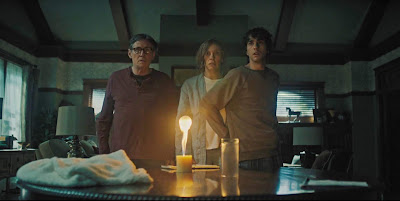 |
| Don't Be Afraid |
WHAT I LOVE ABOUT THIS FILM
When film critic Pauline Kael titled her 1965 collection of reviews I Lost it at The Movies, she was (wittily) referencing the subtle loss of innocence that happens each time one watches a film. It's a slow maturing process that begins with being so unfamiliar with the vocabulary of cinema, everything elicits a strong response because it is all so fresh and new. As we grow more accustomed to the tropes of narrative structure and film's visual language, our experience of moviegoing becomes more enriched, but often at the cost of our ever really being able to recapture that sense of awe and astoundment born of our movie innocence. I readily admit that each new film I see brings the hope of reclaiming a trace of that lost innocence. Even if it's only for the length of one scene.
Hereditary brought a lot of those feelings back for me. Everything about the film caught me off guard. So much so that watching it became a little unnerving for me. It brought back that long-forgotten sense of feeling on edge long after a film ended, my mind carrying around a vague apprehension that resulted in an over-awareness of noises and a wariness of shadows.
Hereditary brought a lot of those feelings back for me. Everything about the film caught me off guard. So much so that watching it became a little unnerving for me. It brought back that long-forgotten sense of feeling on edge long after a film ended, my mind carrying around a vague apprehension that resulted in an over-awareness of noises and a wariness of shadows.
 |
| "You never even cried as a baby- you know that? Not even when you were born." |
A movie like Hereditary makes suspension of disbelief terribly easy, for in addition to being skilled at keeping the viewer off-balance, it's a story told on its own terms, in its own unique voice, and benefits from a distinct, fully-realized world view. And in a horror film landscape increasingly dominated by the box office-friendly predictability of franchises, a movie as audaciously bizarre and off-the-rails as Hereditary feels like a revitalization of the genre.
With each frame crammed to overflowing with information, clues, and foreshadowing, Hereditary is a film that practically demands a second viewing. If only to discover all the pieces of the puzzle that had been laid out, hidden in plain sight, from the first go-round.
PERFORMANCES
It's accepted that horror films, like comedies, rarely get any respect come awards season. For every Sissy Spacek Best Actress nomination for Carrie (1976) or Ellen Burstyn for The Exorcist (1973), there are far too many Mia Farrow (Rosemary's Baby - 1968) - Deborah Kerr (The Innocents - 1961) snubs.
Toni Collette, all exposed nerve-endings and bottled-up tensions, gives the performance of her career in Hereditary. But, unfortunately, she's so inarguably brilliant, her being passed over for an Oscar nomination feels more like a voter response to what can charitably be called a "difficult" film than an oversight regarding one of the most compelling screen performances of the year.
Hereditary boasts superb and sensitive performances from its entire cast, but Toni Collette pushes waaaay beyond the usual boundaries, inhabiting a complicated, dimensional characterization. Equally impressive, to a heartbreaking degree, is Alex Wolff as the son. Not since Timothy Hutton's agonized (and Oscar-winning, I'd like to point out) performance in Ordinary People (1980) have I seen such a movingly recognizable depiction of adolescent grief. There's an unforgettable moment in Hereditary where Wolff, at a point in the story when family relationships are at a peak deterioration point, is standing silently by his bike outside the front door, trying to muster up the courage to simply enter the house. It's a heart-wrenching example of how Ari Aster somehow makes the small moments pay off as powerfully as the large scale.
It's accepted that horror films, like comedies, rarely get any respect come awards season. For every Sissy Spacek Best Actress nomination for Carrie (1976) or Ellen Burstyn for The Exorcist (1973), there are far too many Mia Farrow (Rosemary's Baby - 1968) - Deborah Kerr (The Innocents - 1961) snubs.
Toni Collette, all exposed nerve-endings and bottled-up tensions, gives the performance of her career in Hereditary. But, unfortunately, she's so inarguably brilliant, her being passed over for an Oscar nomination feels more like a voter response to what can charitably be called a "difficult" film than an oversight regarding one of the most compelling screen performances of the year.
Hereditary boasts superb and sensitive performances from its entire cast, but Toni Collette pushes waaaay beyond the usual boundaries, inhabiting a complicated, dimensional characterization. Equally impressive, to a heartbreaking degree, is Alex Wolff as the son. Not since Timothy Hutton's agonized (and Oscar-winning, I'd like to point out) performance in Ordinary People (1980) have I seen such a movingly recognizable depiction of adolescent grief. There's an unforgettable moment in Hereditary where Wolff, at a point in the story when family relationships are at a peak deterioration point, is standing silently by his bike outside the front door, trying to muster up the courage to simply enter the house. It's a heart-wrenching example of how Ari Aster somehow makes the small moments pay off as powerfully as the large scale.
THE STUFF OF FANTASY
Singular-vision films like Hereditary and Get Out--both amplifications of the day-to-day terrors of contemporary life--do a great job of injecting some much-needed vitality and blood (literally) into a genre grown anemic over the years of tapping into the same worn-out vein of horror tradition. It took Aster five years to get Hereditary to the screen, directing from his own screenplay, and, from all accounts, finalizing every detail of the production before even a foot of film was shot. The end result is one of the most effectively scary horror films I've ever seen. An uncompromising work of individuality that still manages to pluck the nerves of universal anxieties.
Annie's art installation dioramas were created by Steve Newburn, and Hereditary's stunning production design was by Grace Yun. Everything from Colin Stetson's shivery musical score to cinematographer Pawel Pogorzelski's eerily burnished images, combined with Aster's sculptural blocking and emphatic use of stillness, turns the characters into mannequins--work in concert to formulate Hereditary's blue-hued world of haunted interiors.The members of the Graham family move about from one isolated space to another. Even when they leave the confines of their homes, they merely find new places to be alone.
THE STUFF OF DREAMS
For me, the mark of a truly effective horror film, a quality evident in favorites like Rosemary’s Baby, Carrie, or Don’t Look Now, has always been its ability to make me feel something for the characters. To get me to relate to and/or empathize with their circumstances to the degree that I care what happens and I’m engaged in whatever conflicts—emotional or psychological—arise.
Horror films are hollow films if they don't feature characters with whom you can identify or situations whose outcomes you can become invested in. Hereditary goes to places that even fans of the genre find disturbing, but the darkness feels at one with the world Aster has created.
I don't know what kind of mind could come up with a movie like Hereditary, let alone the genius capable of pulling it off so tremendously. But my hat is off to Ari Aster for taking so many chances, and in the process, reminding me what a thrill it is to be scared at the movies again.
 |
| In the equally-bereaved Joan, Annie finds someone outside the home to whom she can confide. Or has she? |
Horror films are hollow films if they don't feature characters with whom you can identify or situations whose outcomes you can become invested in. Hereditary goes to places that even fans of the genre find disturbing, but the darkness feels at one with the world Aster has created.
I don't know what kind of mind could come up with a movie like Hereditary, let alone the genius capable of pulling it off so tremendously. But my hat is off to Ari Aster for taking so many chances, and in the process, reminding me what a thrill it is to be scared at the movies again.
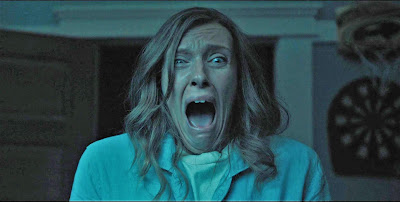 |
| Unsafe Cinema Nothing's more terrifying than a horror film that takes death, loss, and grief seriously. |
Clip from "Hereditary" (2019)
BONUS MATERIAL
Hereditary father and son Gabriel Byrne and Alex Wolff played father and son in the HBO series In Treatment from 2008 to 2010.
 |
| Psychologist Paul Weston and his son Max |
 |
| Modern Family / Ordinary People The original cut of Hereditary ran 60 minutes longer than the theatrical release. The original shooting script is available to read HERE. |
Copyright © Ken Anderson 2009 - 20019






































